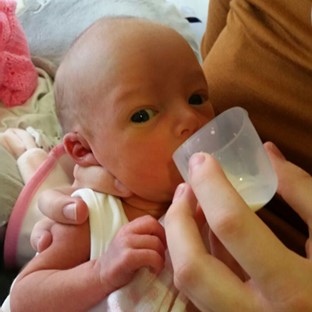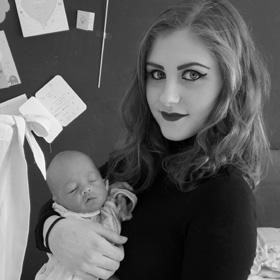Chloe's breastfeeding journey
Supporting young mums to breastfeed is one of the key outcomes for Family Nurse Partnership.
That's why improving breastfeeding rates is an area our ADAPT project will focus on through clinical adaptations to the FNP programme. ADAPT is part of FNP Next Steps, an ambitious programme of work led by the FNP National Unit to ensure FNP in England achieves the best possible outcomes for young families.
Our most recent data from FNP clients (2017) shows that breastfeeding initiation rates programme-wide are currently at 62%.
But what does this journey really feel like for young mums?
Chloe Giles, 18, worked with her family nurse throughout her breastfeeding journey and shares her story here.
I initially found out about the Family Nurse Partnership (FNP) through my midwife, and shortly after, had an introductory call with a family nurse who told me a bit more about the programme. I felt quite confident about having a baby, but I was only 17 so I thought the extra support would be great. When I met Hen, my family nurse, she was very warm and friendly and I knew straight away that I could talk to her about any concerns or problems I was having.
During pregnancy, Hen and I talked about breastfeeding and she gave me lots of booklets and information about the benefits of breastfeeding and different feeding positions I could try with my baby. I also had great support from my mum who had breastfed me and my three siblings from birth. She told me how she loved to breastfeed and was a great role model for me. I felt supported and confident when the time came for me to have my baby.
Breastfeeding challenges began soon after birth
I had a baby girl, Addie, three weeks before her due date in February. After she was born, with the help of my midwife, Addie latched on to feed straight away, but our success was short-lived. In the days after her birth, Addie wouldn’t latch so I hand-expressed milk to feed it to her through a syringe or a bottle. At just three days old, she started to lose weight and look jaundiced, so I took her back to hospital for some tests. The doctors found that the problem was that because Addie couldn't latch on, she wasn't getting enough milk, causing her weight-loss and jaundice.
Learning to latch on
As Addie was three weeks premature, I felt that she didn’t initially understand what she needed to do in order to feed. I fed her through a bottle a little bit, but also started to use a nipple shield recommended to me by nurses in hospital. Hen also really helped me at this stage by showing me different positions to hold Addie to encourage her to latch and get used to the experience. Gradually she started to become more familiar with how to feed, and after using a nipple shield for one month, I began to remove it mid-way through feeds. Now, Addie latches on to me straight-away whenever I go to feed her. Hen’s support during this stage of the programme was amazing, and I really feel that her praise helped keep me motivated and not give up.

Chloe feeding newborn Addie expressed breastmilk.
Changing my diet
After another three nights at home alternating between milk straight from the breast and expressed breast milk, Addie started to pass bloody stools. On our second return to hospital, she was quickly put on a drip to help build her weight and strength. During this stay, as I wasn’t required to feed her naturally, my milk supply started to drop. I was devastated, but I was determined to breastfeed, so began to pump my milk to ensure my supply returned.
Doctor’s eventually discovered that Addie was allergic to cow’s milk protein, which meant that if I wanted to continue to breastfeed her, I needed to cut dairy products out of my diet completely. Although this was so difficult to start with, I immediately made the necessary changes. I made sure from then on that I thoroughly checked every food label in the supermarket so my milk was safe for her.
Perseverance helped me give my baby the best start in life
Addie has now gone from 5.4lbs to a healthy weight of 13lbs in 5 months. She is a happy, healthy baby with lovely chubby legs! She really enjoys breastfeeding and I love the bond I share with her during feeding times. Cutting dairy out of my diet and persevering with her latching ability has been a challenge, but I would have done anything for her to ensure she had, and continues to have, the best start in life.
Breastfeeding isn’t for everyone, but I would definitely recommend it to all mothers. Feeding really helps to build the bond between you and your baby, and our journey is proof that although you may face obstacles, you can overcome them with a bit of perseverance. Nobody should be judged through their choice of whether or not to breastfeed, but I have personally felt so supported by my friends, family and Hen have been a great source of support during our journey so far.
